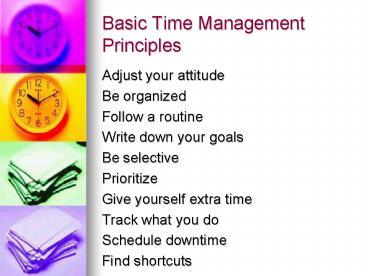Basic Time Management Principles - PowerPoint PPT Presentation
1 / 11
Title:
Basic Time Management Principles
Description:
Have a place for everything and put things away as soon as you are done using them. ... Clutter is a big time-waster. Follow a routine ... – PowerPoint PPT presentation
Number of Views:39
Avg rating:3.0/5.0
Title: Basic Time Management Principles
1
Basic Time Management Principles
- Adjust your attitude
- Be organized
- Follow a routine
- Write down your goals
- Be selective
- Prioritize
- Give yourself extra time
- Track what you do
- Schedule downtime
- Find shortcuts
2
Adjust your attitude
- Being busy is not something that life does to us
we do it to ourselves. Some things are beyond
our control, but many things are not.
3
Be organized
- Have a place for everything and put things away
as soon as you are done using them. - Put items that are oft-used in a more accessible
location and file everything else away. - Be ruthless about throwing things away if they
are no longer needed. Clutter is a big
time-waster.
4
Follow a routine
- Make a daily, weekly, monthly, quarterly and
annual routine and follow it. - Routines help you make sure you dont forget to
do things. - Be proactive - stagger periodic tasks so they
dont overwhelm you all at once. - Make checklists of oft-repeated tasks, so you
dont have to think about them. - Routines are good for your mental and physical
well-being.
5
Write down your goals
- List specific goals like buying a house,
obtaining a certain job, paying off debts,
finishing a big project, etc. Include specific
dates. - List general goals like spending lots of time
with family, having a fulfilling career, being
healthy or contributing something to society. - Write your goals down and refer back to them
often keeping them fresh in your mind will help
you to avoid time-wasting distractions and later
regret.
6
Be selective
- Make a mental list of criteria for accepting a
new task and if something doesnt fit your
criteria, say no. - Dont try to please everyone, or you may end up
pleasing no one. - Try to get people to answer their own questions.
- Ask people what their timeline is and how crucial
their needs are dont just assume that every
new request is an emergency. - Remember that not everything is your
responsibility - dont be afraid to delegate.
7
Prioritize
- Once you have a list of things to do, schedule
them according to their importance. - Sometimes it may make sense to do a bunch of
small tasks first, to clear your mind for a
bigger task. - Other times you may have to just ignore the small
stuff to get the big projects done. - If you are more alert at certain times of the
day, do harder tasks then and save the more
menial stuff for another time.
8
Give yourself extra time
- Allow for the unexpected. If it takes 15 minutes
to get to work, give yourself 30. - Be prepared - check the weather forecast ahead of
time so that youll know if you need more time to
get to work. - For time-critical things like catching a plane,
give yourself lots of extra time. The cost of
being an hour early is much less than the cost of
being even a second too late.
9
Track what you do
- Keep a detailed log on occasion to see how you
are really spending your time. - Write a daily journal to help yourself remember
why you made certain decisions or how you fixed
something. Dont reinvent the wheel. - Evaluate yourself on a regular basis to make sure
that the way you are prioritizing tasks is in
line with your goals.
10
Schedule downtime
- If you dont make time for downtime, you may
either never get it or end up sacrificing
something you shouldnt because youre going
crazy. - Schedule specific times to spend with family or
friends on a regular basis, and keep the
appointment. - Dont sacrifice downtime for work your work
will end up suffering in the long run.
11
Find shortcuts
- For the super-busy person
- Learn to speed-read.
- Take notes in shorthand.
- Take reading materials or note cards with you
everywhere - you can read them on the bus, while
waiting in line at the bank, etc. - Dont do things at the same time or in the same
place as everyone else. - Batch related tasks save up several errands
that are in the same part of town and do them at
the same time. - Learn the flow and schedules of people and places
around you, and adapt yourself to them.































